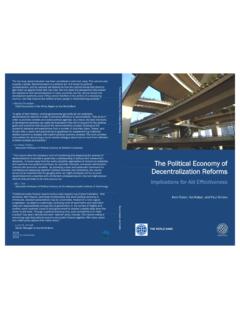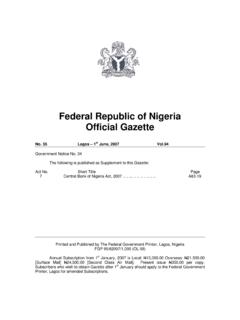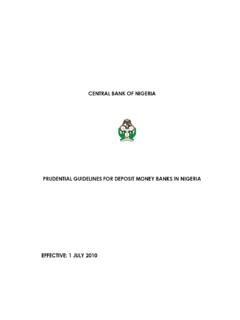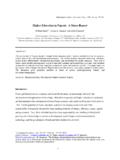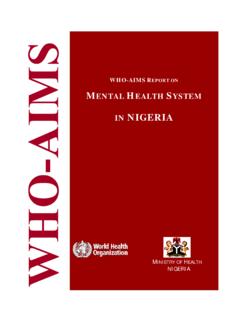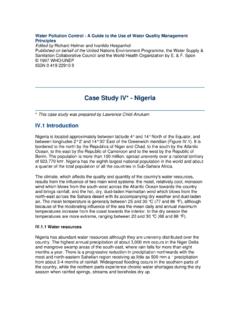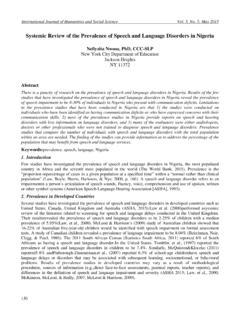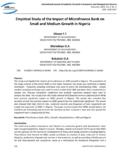Transcription of Water Supply & Sanitation in Nigeria - World Bank
1 FEDERAL REPUBLIC OF Nigeria . Water Supply & Sanitation Interim Strategy Note November 2000. ii Contents Executive Summary I. Introduction II. Country and Sector Background A. Political and Economic Context Geography and Climate Population Economic Conditions The Centrality of Water Supply and Sanitation to Economic Development B. Background of Water Sector Water Resources Water Supply and Sanitation Coverage Institutional Aspects National Water Supply and Sanitation Policy III. Current Status A. Urban Water Supply & Sanitation The Large Urban Utility Problem Urban Sanitation Government's Response B. Small Towns Water Supply & Sanitation The Small Towns Water & Sanitation Problem Management of Water Facilities Status of Sanitation Facilities Government's Response C. Rural Water Supply & Sanitation The Rural Water Supply Problem Government's Response D.
2 Water Resources Management E. Investment Needs IV. Sector Vision and Proposed bank Lending Strategy A. Shared Government- World bank Vision for Water and Sanitation Reform B. PSP Strategies as Principal Thrust for the Urban Market Suitability of Large Urban Water for PSP. Incremental Approach to PSP: One Size Does Not Fit All Appropriate Regulation to Support the Reform Realignment of Institutional Responsibilities Funding and Cost Recovery Issues Procedures in Implementing Reform C. Urban Sanitation D. Small Towns Water Supply & Sanitation E. Rural Water Supply and Sanitation F. Water Resources Management G. Suggestions for a World bank Supported Program H. Donor Support Annexes and Tables 1. Comments on the Government's National Water Supply & Sanitation Policy 2. Urban Water Sector Assessment of Current Status 3. Private Sector Participation in Urban Water Supplies 4.
3 State Water Agency Performance Indicators iii Executive Summary (i) The Nigerian Government has long considered the provision of Water Supply and Sanitation services to be the domain of the federal, state and local governments. However, the public sector has not been successful in meeting more than a small portion of the demand for Water and Sanitation of residential and commercial users. Services are in critically short Supply . For example, out of the 85. million people living in urban and semi-urban areas, less than half have reasonable access to reliable Water Supply . Many households, often the poorest, end up purchasing Water from private vendors much more expensively than from the public Supply . Water Supply services, where they exist, are unreliable and of low quality and are not sustainable because of difficulties in management, operation and pricing and failure to recover costs.
4 Many Water Supply systems show extensive deterioration and poor utilization of existing capacities, due to under-maintenance and lack of funds for operation. (ii) Additionally, the high cost of imported equipment especially in terms of a depreciating currency, and inadequate cost recovery policies have contributed to large financial deficits in many State Water Authorities (SWAs). This has left most SWAs dependent upon state subventions to finance operations and maintenance of their Water systems, to service debt and to finance new investments. The states'. own financial constraints have often limited the amount and dependability of recurrent and capital subventions requiring the SWAs to defer maintenance and limit new investment. (iii) This Strategy Note, prepared in conjunction with the Federal Ministry of Water Resources (FMWR), presents a joint vision for sector development, and provides a proposed lending strategy for the bank in the Water Supply and Sanitation sector in four segments, namely, urban, small towns, rural, and Water resources management.
5 Because Water Supply and Sanitation are central to improvements in so many aspects of human development, health, education, urban and rural development, development of industry and general economic development, and so central to the bank 's primary mission of poverty reduction, it is proposed that Water Supply and Sanitation should become a primary focus in the bank 's program of assistance to Nigeria . (iv) In the urban Water and Sanitation sub-sector, a fundamental re-orientation is needed in the concept of provision of services. Reforms require a profound change in institutional and regulatory framework based on the concept of Water Supply as a service industry. In spite of the public monopoly characteristics of Water Supply , by separating infrastructure investment and ownership from service operation, it is possible to introduce competition with significant efficiency gains.
6 Enabling SWAs to gain more autonomy, followed and/or accompanied by greater commercialization of specific aspects via service, management and/or lease contracts with private firms could increase efficiency as has been demonstrated in neighboring countries of Cote d'Ivoire, Senegal and Guinea. Detailed legal, institutional and financial preparations are necessary for the transition from the current status of Nigeria 's Water utilities to efficiently managed, adequately regulated systems, and for conversion of existing SWAs to different roles as asset owners or regulators. (v) In the small towns Water and Sanitation sub-sectors, the bank will support and strengthen the government's policy of decentralizing ownership and management of Water Supply systems to attract and involve optimal community involvement and support by the private sector, including operation under contract, and regularizing the services of independent providers or franchisers.
7 In small towns, the focus is on community ownership coupled with local private sector contracting for operations. In rural areas, the focus is on increasing the sharing of ownership and management by communities and local governments, with communities taking charge of operations and maintenance as well. Fiscally, both in small towns and rural areas, the focus must be on phasing out of subsidies for maintenance altogether, and restricting such subsidies to partial capital costs to engender greater community ownership. iv (vi) With respect to Water resources management, because of the increasing problems of Water shortage in the north, major pollution problems such as in the Delta area, difficulties due to uneven distribution in the south, and potential issues with international waters, the Government now recognizes the need to manage Water resources in an integrated and sustainable manner, and, supported by donors and the bank , has embarked on the preparation of a National Water Resources Management Strategy (WRMS).
8 Involving all stakeholders in order to ensure integrated management and development of its Water resources. (vii) In regard to Sanitation , the task is stupendous in scope as the extent of the existing drainage and sewerage network is miniscule in view of overall need. More work is needed to develop Sanitation policies and strategies, particularly for urban areas, however a two pronged Sanitation strategy should have an immediate priority of on-site Sanitation , and community owned and operated public toilets, and focus in the longer term on incrementally developing drainage, sewerage networks and wastewater treatment and disposal facilities. (viii) Total investment needs depend on coverage and level of service that is sought. For 80% coverage within 20 years, with about 50% of those served in urban areas having household Water connections, about $10 billion each are needed for investment in Water and Sanitation .
9 This represents $1 billion per year or 3% to 4% of Nigeria 's current GDP. Regardless of the coverage and service level that is sought, clearly huge resources from many sources are required to have a significant impact. (ix) A suggested bank program for future support to the sector is provided. It includes: An immediate project to support the reform of the urban Water sector in moves towards privatization. It is emphasized that reform is a complex process requiring a well defined series of activities, and high transparency. This initial project would also provide for urgent rehabilitation needs and wide sectoral support through the Federal Ministry of Water Resources. After individual states have progressed sufficiently and irreversibly with reform, additional bank lending would provide investment funds for the reformed states. Improvements to urban Sanitation would be provided initially through urban upgrading projects, of which the first would be approved during FY 2001.
10 These projects would support selected states. In addition, support to develop urban Sanitation policies would be provided. Separate projects would support Water and Sanitation developments in Lagos because of the magnitude and complexity of its problems, assuming reforms being supported by IFC are successful. Following the recently approved learning and innovation loan for small towns Water Supply and Sanitation , and depending on its outcome, support would also be provided to expand that program. Rural Water and Sanitation would remain with the current FGN/UNICEF program, or be dealt with through integrated rural development projects. A total new World bank lending program in the sector of about $ billion over three years is appropriate, similar to what has existed in the past. (x) The bank has had continued and extensive contact with the sector during the recent quiet period in relations between Nigeria and the bank , including numerous promotional workshops since 1996.

